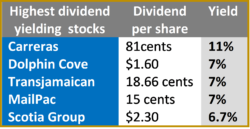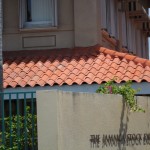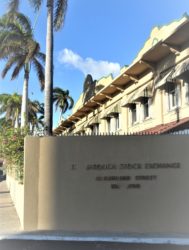 Everything Fresh is one of a hand full of initial public stock offers to be selling below the IPO price months after the issue. The stock that was over priced has only been partially helped by a big jump in 2018 half year profit.
Everything Fresh is one of a hand full of initial public stock offers to be selling below the IPO price months after the issue. The stock that was over priced has only been partially helped by a big jump in 2018 half year profit.
The fall in the price was due to over pricing the initial offer and failure to provide more up to date information on the 2018 performance to the time of the IPO and to address developments with the margins. Even with improved results, the stock remains one of the higher priced units on the Junior Market, at a PE of 14 times this year’s pretax earnings and is in line with the market’s average.
Boosted by a big jump in profit margins, earnings after tax jumped 180 percent in the June quarter, to $26.5 million from $9.5 million in 2017. For the six months to June, profit climbed 99 percent to $38.6 million from $19.4 million in 2017. For the next five years, profit will be free of corporate taxes and in the second five years will pay taxes at half the regular rate.
Sales revenue rose 9.7 percent for the quarter, to $494 million from $451 million and increased 6 percent for the half year, to $969 million from $915 million in 2017.
Improvement in profit margin in the first half of the year that grew from 8 percent to 11 percent, increased further to 13 percent in the June quarter and was the major contributor for the sharp increase in profit. The Chairman, Gregory Pullen informed IC Insider.com, that the company took a deliberate decision in 2017 to go after certain clients with an introduction of low margins, with the expectation that they would be able to enjoy higher margins in 2018 onwards.

Everything Fresh two major owners and directors, Mr. & Mrs. Pullen.
The effect of the changes, operating profit rose 84 percent in the quarter, to $66 million from $36 million and increased 49 percent for the year to date, to $108 million from $72 million in 2017.
Sharp increase in administrative expenses by 38 percent to $28 million in the quarter and by 30 percent in the six months period to $54 million, kept the growth in the top line from filtering fully into profit. Marketing expenses associated the public of share issue added to cost in the period. Finance cost rose in the quarter, to $5 million from $4.3 million in 2017 and from $8.7 million to $9.3 million for the six months.
Earnings per share before tax came out at 5 cents for the quarter and 8 cents for the six months and should end the year at 15 cents for PE of 14 times 2018 earnings and 10 times 2019 projected earnings of 20 cents per share. The stock traded at $2.10 on the Junior Market of the Jamaica Stock Exchange on Friday.
Gross cash flow brought in $48 million but changes in working capital and inflows from the issue of shares, resulted in $213 million of cash funds as of June. A large portion of the share issue proceeds was received after the end of the quarter, the chairman’s report to shareholders stated.
At the end of June, shareholders’ equity climbed to $651 million from $225 million in 2017. Borrowings stood at just $107 million. Net current assets ended the period at $614 million inclusive of trade and other receivables of $503 million and cash and bank balances of $213 million. Current liabilities ended the period at $207 million.
The company is looking at three meat processing facility locally with a view to acquiring one and expects that discussions will conclude by the end of this year or early in 2019. The plan is to enable the manufacturing of products by them to sell directly to its clients at more competitive prices.


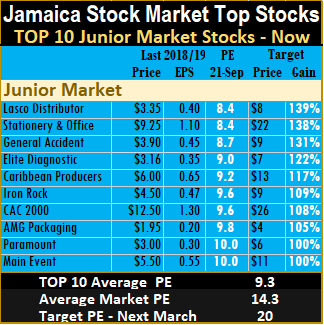
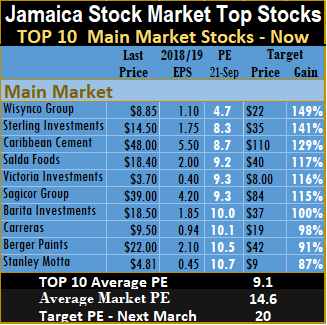 During the past week, the main market of the Jamaica Stock Exchange, racked up more record closes but pulled back on sharply on Thursday and Junior market hit new highs during the week but dropped sharply on Friday due mainly to
During the past week, the main market of the Jamaica Stock Exchange, racked up more record closes but pulled back on sharply on Thursday and Junior market hit new highs during the week but dropped sharply on Friday due mainly to 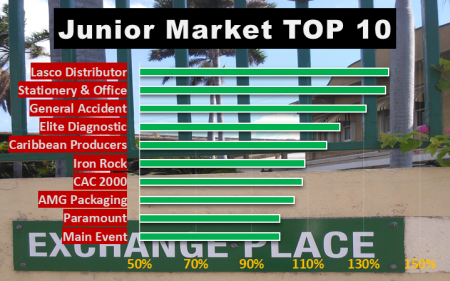 The PE ratio for Junior Market Top 10 stocks average 9.3 up from 8.9 last week, as the market continues to revalue the multiple higher and the main market PE is now 9.1, up from 8.8 last week, for the top stocks.
The PE ratio for Junior Market Top 10 stocks average 9.3 up from 8.9 last week, as the market continues to revalue the multiple higher and the main market PE is now 9.1, up from 8.8 last week, for the top stocks.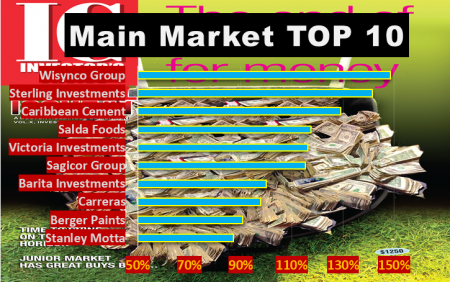 Stocks are selected based on projected earnings for each company’s current fiscal year. Based on an assumed PE for each, the likely gains are determined and then ranked, with the stocks with the highest potential gains ranked first followed by the rest, in descending order. Potential values will change as stock prices fluctuate and will result in movements of the selection in and out of the lists for most weeks. Earnings per share are revised on an ongoing basis based on new information received that can result in changes in and out of the list as well.
Stocks are selected based on projected earnings for each company’s current fiscal year. Based on an assumed PE for each, the likely gains are determined and then ranked, with the stocks with the highest potential gains ranked first followed by the rest, in descending order. Potential values will change as stock prices fluctuate and will result in movements of the selection in and out of the lists for most weeks. Earnings per share are revised on an ongoing basis based on new information received that can result in changes in and out of the list as well.

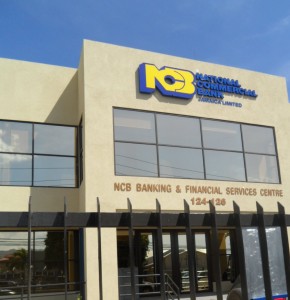
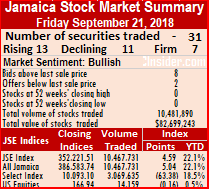
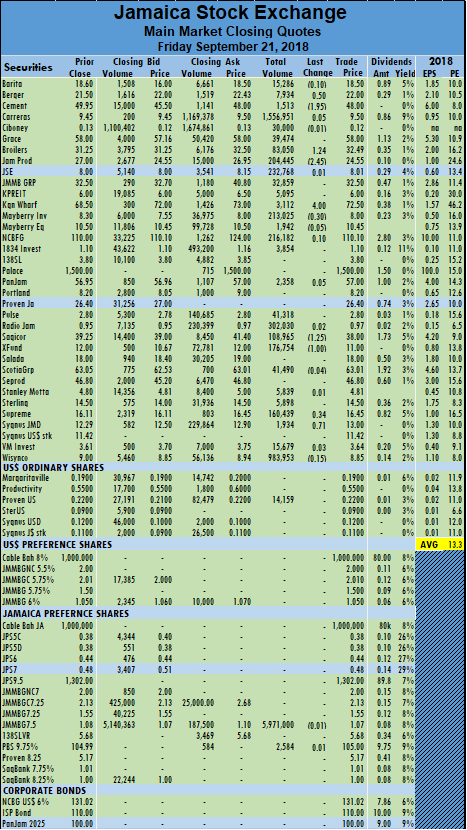
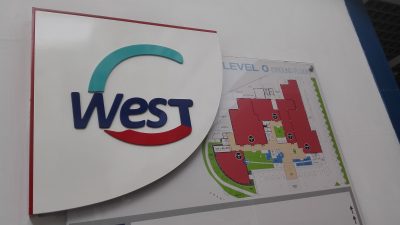
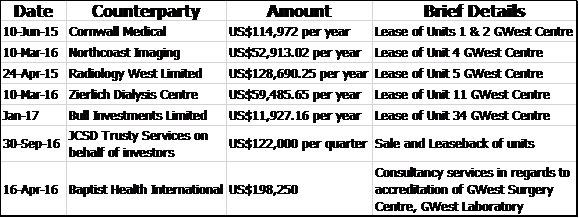 The above list has no contract in connection with the issue of preference shares to shareholders prior to the IPO.
The above list has no contract in connection with the issue of preference shares to shareholders prior to the IPO.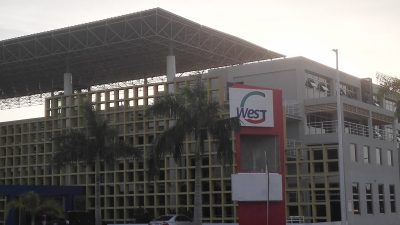 Further, by an ordinary resolution dated November 28, 2017 the 10,000 shareholdings of shareholders on register at November 27, 2017 were split such that their holdings of ordinary shares became 10,000,000 ordinary shares. Additionally, the shareholders who were allocated the 9,800 available shares at March 31, 2017, were further allocated 314,848,485 ordinary shares for the consideration of $50 million of interest converted to capital on March 31, 2017. (13.3) On December 7, 2017 the company made an offer for subscription to the public (IPO), of 160,000,000 of its ordinary shares at a price of $2.50 per share through the Junior Market of the Jamaica Stock Exchange (JSE). The company was officially registered on the Junior Stock Market on December 21, 2017. Total cost of the IPO of $30.848 million has been off-set against the issued share capital.”
Further, by an ordinary resolution dated November 28, 2017 the 10,000 shareholdings of shareholders on register at November 27, 2017 were split such that their holdings of ordinary shares became 10,000,000 ordinary shares. Additionally, the shareholders who were allocated the 9,800 available shares at March 31, 2017, were further allocated 314,848,485 ordinary shares for the consideration of $50 million of interest converted to capital on March 31, 2017. (13.3) On December 7, 2017 the company made an offer for subscription to the public (IPO), of 160,000,000 of its ordinary shares at a price of $2.50 per share through the Junior Market of the Jamaica Stock Exchange (JSE). The company was officially registered on the Junior Stock Market on December 21, 2017. Total cost of the IPO of $30.848 million has been off-set against the issued share capital.”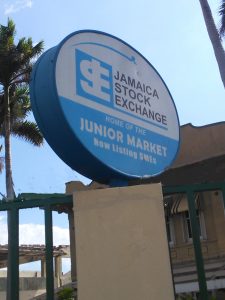 The Junior Market dropped by an unusually large 136.58 points to close at 3,299.73 on Friday as
The Junior Market dropped by an unusually large 136.58 points to close at 3,299.73 on Friday as 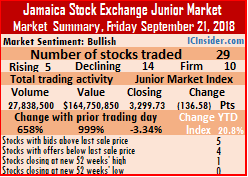
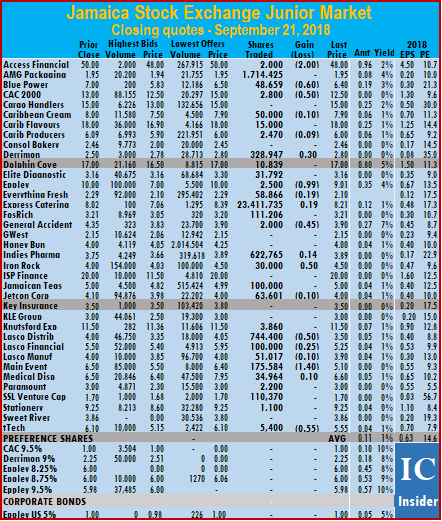 General Accident finished trading 2,000 shares with a loss of 45 cents at $3.90, Indies Pharma gained 14 cents and closed trading with 622,765 shares changing hands at $3.89,
General Accident finished trading 2,000 shares with a loss of 45 cents at $3.90, Indies Pharma gained 14 cents and closed trading with 622,765 shares changing hands at $3.89,  Express Catering traded more than 23 million with the price dropping from $8.02 at the close on Thursday to $6.40 in the morning session of trading on the Junior Market and along with Lasco Distributors that fell to $3.50 and Main Event that traded at $5.10 from $6.50 did immense damage to the market index on Friday.
Express Catering traded more than 23 million with the price dropping from $8.02 at the close on Thursday to $6.40 in the morning session of trading on the Junior Market and along with Lasco Distributors that fell to $3.50 and Main Event that traded at $5.10 from $6.50 did immense damage to the market index on Friday. All market indices of the Trinidad & Tobago Stock Exchange, ended with modest gains on Friday as 17 securities changed hands up from 13 on Thursday.
All market indices of the Trinidad & Tobago Stock Exchange, ended with modest gains on Friday as 17 securities changed hands up from 13 on Thursday.  ended at $56, with 416 stock units changing hands, Ansa Merchant completed trading at $38, with 1,226 units, Clico Investments settled at $19.90, after exchanging 11,000 shares, First Citizens completed trading at $32.60, with 50 units, JMMB Group ended at $1.65, with 7,439 stock units changing hands, Massy Holdings ended at $47.20, in exchanging 6,764 stock units NCB Financial Group completed trading 19,050 units at $5.73, Republic Financial Holdings ended at $103.69, with 187 stock units changing hands, Sagicor Financial completed trading at $7.70, with 50,000 units, Scotiabank ended at $64.94, in exchanging 10,512 stock units and West Indian Tobacco concluded at $88.45, after exchanging 1,062 shares.
ended at $56, with 416 stock units changing hands, Ansa Merchant completed trading at $38, with 1,226 units, Clico Investments settled at $19.90, after exchanging 11,000 shares, First Citizens completed trading at $32.60, with 50 units, JMMB Group ended at $1.65, with 7,439 stock units changing hands, Massy Holdings ended at $47.20, in exchanging 6,764 stock units NCB Financial Group completed trading 19,050 units at $5.73, Republic Financial Holdings ended at $103.69, with 187 stock units changing hands, Sagicor Financial completed trading at $7.70, with 50,000 units, Scotiabank ended at $64.94, in exchanging 10,512 stock units and West Indian Tobacco concluded at $88.45, after exchanging 1,062 shares.


